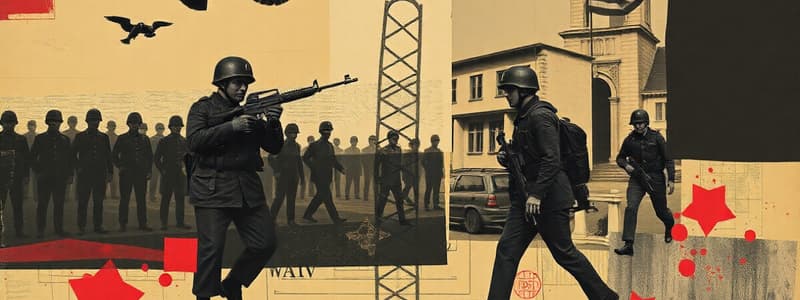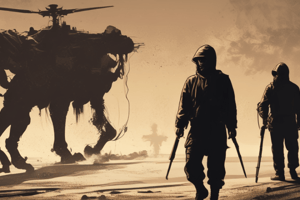Podcast
Questions and Answers
What defines war crimes?
What defines war crimes?
- Minor violations of civil law during conflicts.
- Serious violations of international humanitarian law during armed conflict. (correct)
- Acts of terrorism targeting military personnel.
- Disregard for political treaties and agreements.
Which of the following is an example of a crime against humanity?
Which of the following is an example of a crime against humanity?
- Forced conscription of soldiers.
- Systematic extermination of a group. (correct)
- Inhumane treatment of prisoners of war.
- Deliberate attacks on civilian populations.
What can the International Criminal Court (ICC) do regarding war crimes?
What can the International Criminal Court (ICC) do regarding war crimes?
- Prosecute states for war crimes.
- Prosecute individuals when national courts are unable or unwilling. (correct)
- Offer amnesty to individuals accused of war crimes.
- Appeal directly to military leaders for justice.
Which of the following acts is considered a grave breach of the Geneva Conventions?
Which of the following acts is considered a grave breach of the Geneva Conventions?
What is a characteristic of hybrid courts?
What is a characteristic of hybrid courts?
What is one purpose of international cooperation in the prosecution of war crimes?
What is one purpose of international cooperation in the prosecution of war crimes?
What is a specific act under international law that is considered a war crime?
What is a specific act under international law that is considered a war crime?
Who can be prosecuted for war crimes under the ICC jurisdiction?
Who can be prosecuted for war crimes under the ICC jurisdiction?
Flashcards
What are war crimes?
What are war crimes?
Serious violations of international humanitarian law (IHL) committed during armed conflicts. They are grave breaches of the Geneva Conventions and other IHL provisions.
Key Elements of War Crimes
Key Elements of War Crimes
Acts that demonstrate intent or knowledge of causing harm, such as killing, torturing, or ill-treating civilians, prisoners of war, or other protected individuals during an armed conflict.
Crimes Against Humanity
Crimes Against Humanity
Crimes against humanity are widespread or systematic attacks against a civilian population. Examples include extermination, genocide, enslavement, and persecution.
Grave Breaches of the Geneva Conventions
Grave Breaches of the Geneva Conventions
Signup and view all the flashcards
Other War Crimes
Other War Crimes
Signup and view all the flashcards
International Criminal Court (ICC) Jurisdiction
International Criminal Court (ICC) Jurisdiction
Signup and view all the flashcards
Accountability and Prosecution
Accountability and Prosecution
Signup and view all the flashcards
Hybrid Courts and Cooperation
Hybrid Courts and Cooperation
Signup and view all the flashcards
Study Notes
Definition and Elements
- War crimes are serious violations of international humanitarian law (IHL) committed during armed conflict.
- These violations are grave breaches of the Geneva Conventions and other IHL provisions.
- Key elements typically include an act, a specific type of victim, circumstances of the act (such as during an armed conflict), and the intent or knowledge of the perpetrator.
- Examples include murder, torture, ill-treatment, and the destruction of civilian property.
- Specific acts detailed in the Geneva Conventions, such as deliberate attacks targeting civilians and the killing of prisoners of war, are considered war crimes.
Categories and Examples of War Crimes
- Crimes against humanity: These are widespread or systematic attacks directed against a civilian population. Examples include extermination, genocide, enslavement, and persecution.
- Grave breaches of the Geneva Conventions: These violations involve intentional violence or mistreatment of protected persons in conflicts. These may involve acts like inhumane treatment, torture, and murder of civilians, prisoners of war, and medical personnel.
- Other war crimes: These offenses include specific prohibited acts during international or non-international armed conflicts; these may further encompass violations of the laws of war regarding the use of weapons and conduct of hostilities. Specific prohibited acts are defined in international instruments.
International Criminal Court (ICC) Jurisdiction
- The International Criminal Court (ICC) has jurisdiction over war crimes when national courts are unable or unwilling to prosecute.
- The ICC's jurisdiction extends to situations where the crimes occurred within the territory of a state party or where the accused is a national of a state party.
- The ICC can prosecute individuals, not states, for war crimes.
Accountability and Prosecution Mechanisms
- National courts can prosecute those accused of war crimes under domestic laws.
- International tribunals, like the International Criminal Tribunal for the Former Yugoslavia (ICTY) and the International Criminal Tribunal for Rwanda (ICTR), were established to prosecute war crimes after specific conflicts.
- Hybrid courts, combining international and national elements, can also be used.
- International cooperation and coordination are crucial for effective investigation, prosecution, and punishment of perpetrators.
Contextual Considerations
- War crimes often occur in the midst of conflict, making investigations complex.
- Political and economic factors may influence the process of accountability
- Evidence collection and witness testimony can be challenging in conflict zones.
- The potential for bias and intimidation from all sides involved in a conflict should be considered.
Distinction Between War Crimes and Other Offenses
- War crimes are specifically crimes committed in armed conflict.
- They are different from other domestic or international crimes. Distinctions are based on the context and the specific prohibited actions.
- It's important to understand the distinctions to avoid conflating various illegal acts.
Studying That Suits You
Use AI to generate personalized quizzes and flashcards to suit your learning preferences.




